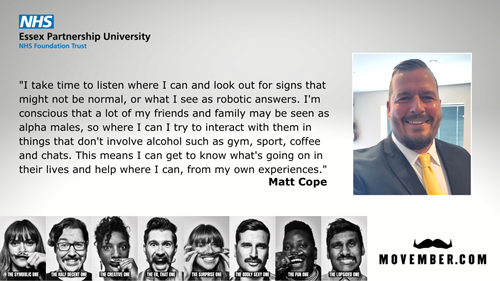Movember is a month-long awareness event which takes place throughout November each year. It's aimed at raising awareness of men's mental and physical health. 'Our fathers, partners, brothers and friends are facing a health crisis, yet it's rarely talked about. Men are dying too young. We can't afford to stay silent.' Movember are the leading charity changing the face of men's health, focussed on mental health and suicide prevention, prostate cancer and testicular cancer.
As part of Movember, we'll be hearing from male colleagues about how they look after their wellbeing and how they look out for others. We spoke to Matt Cope, HR Business Partner at EPUT, and you can read his blog below.

Preferred name:
HR Business Partner
What does your role at EPUT entail?
My role is to work in partnership with executive leaders, service directors, key stakeholders and HR colleagues to shape, develop and deliver HR plans and solutions in line with the needs and priorities of the trust. Operating as the departmental HR expert, to advise, guide and support staff and managers by providing high level people management and development support across designated directorates.
What do you like most about working here?
I like working with my team/close colleagues and the managers I work with on challenging projects, especially the staff who work tirelessly for this organisation.
How do you look after your physical and mental wellbeing?
I try and go to the gym when I can and play sports. Movement and exercise is key to helping to improve sleep and reduce stress and anxiety. I think it's so important to have close friends and colleagues to talk to when I have difficult moments in life and at work.
What do you enjoy doing outside of work?
Spending time with family, friends and socialising where I can. I love going to the cinema and watching movies. I can't play rugby anymore as I suffered an injury, but I've taken up boxing again, which helps to improve my physical and mental health. I have a really close relationship with my family, so I enjoy mini breaks, dinners and taking my kids, nieces and nephews out.
In what ways do you look out for your male family members, friends and colleagues?
I take time to listen where I can and look out for signs that might not be normal or what I see as robotic answers. I'm conscious that a lot of my friends and family may be seen as alpha males, so where I can I try to interact with them in things that don't involve alcohol such as gym, sport, coffee and chats. This means I can get to know what's going on in their lives and help where I can from my own experiences.
How would you spot the signs that someone might not be ok?
Mostly where friends don't message me or take a while to message back. Again I'll reflect on their response when I am talking with them in groups. I don't always raise anything at that point, but maybe after I will message or call them and reflect on what I noticed to check they are okay. The answers might be short and I try to probe where I can through humour or common interests like sport or movies.
What would you say to encourage your male family members, friends and colleagues to look after themselves and reach out if they need to?
Interestingly enough I listened to a podcast by Tony Adams MBE which is sponsored by the NHS about a year ago and it absolutely blew my mind. I was going through a difficult time myself and this short podcast and story really related to me and the difficulties us men struggle with, being honest about men's mental and physical health. Since then I have shared this with many of my friends, and they have either taken elements that have helped them or looked at referring to certain mental health support mechanisms, which I think is fantastic.
This is the link and I would urge any of my male colleagues to listen – I did it on a work trip from home to St Margarets and back again and it was well worth the hour listen.
Tell us an interesting fact about you.
My whole life I have struggled with a learning difficulty (Dyslexia) and I still suffer with it today, but recently my story was published in the Peoples Management Magazine for my honest struggles and development.

